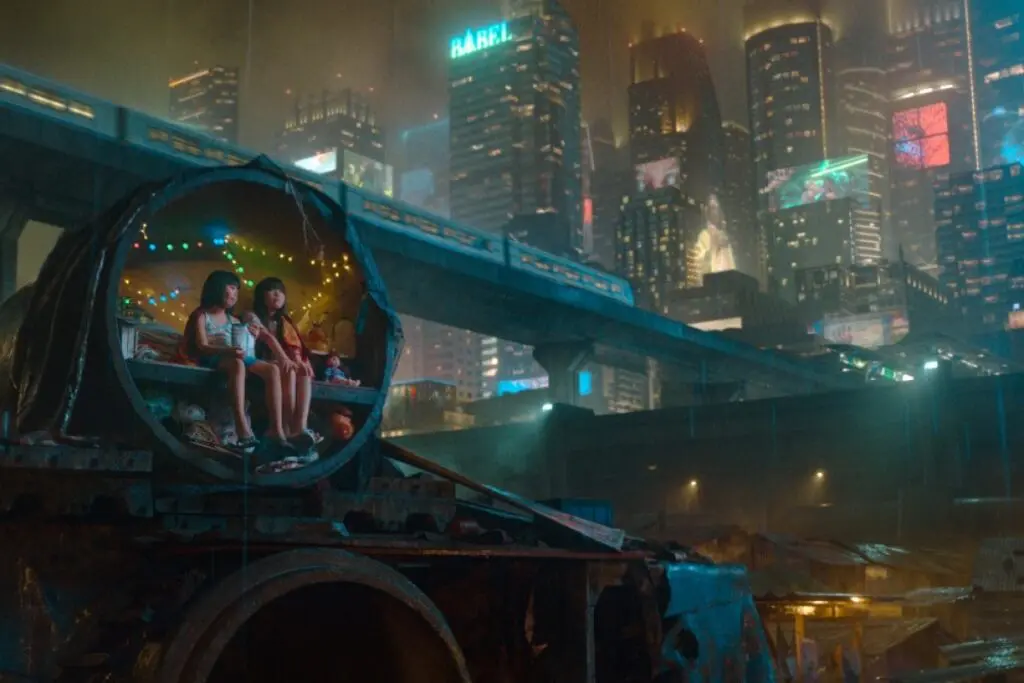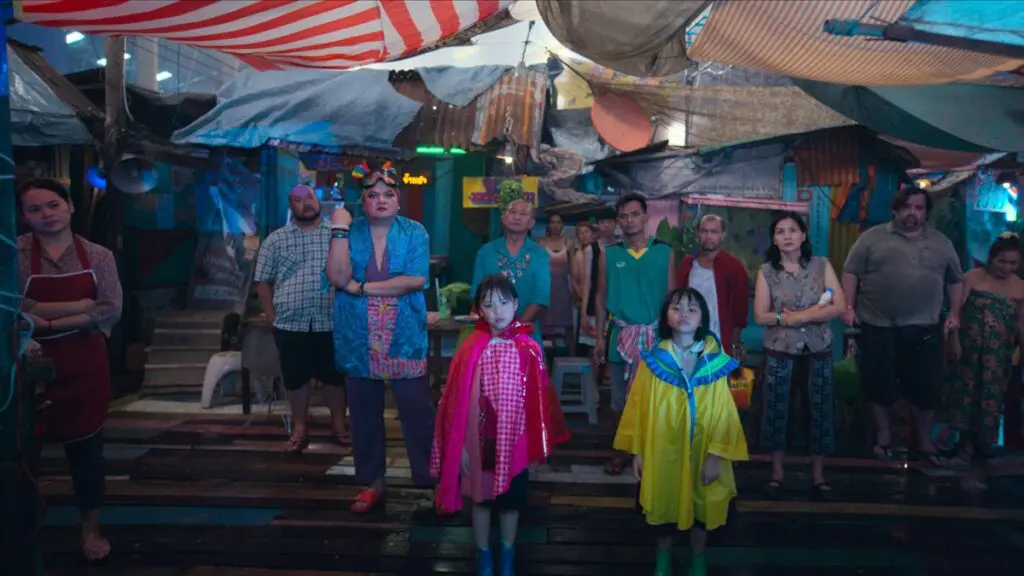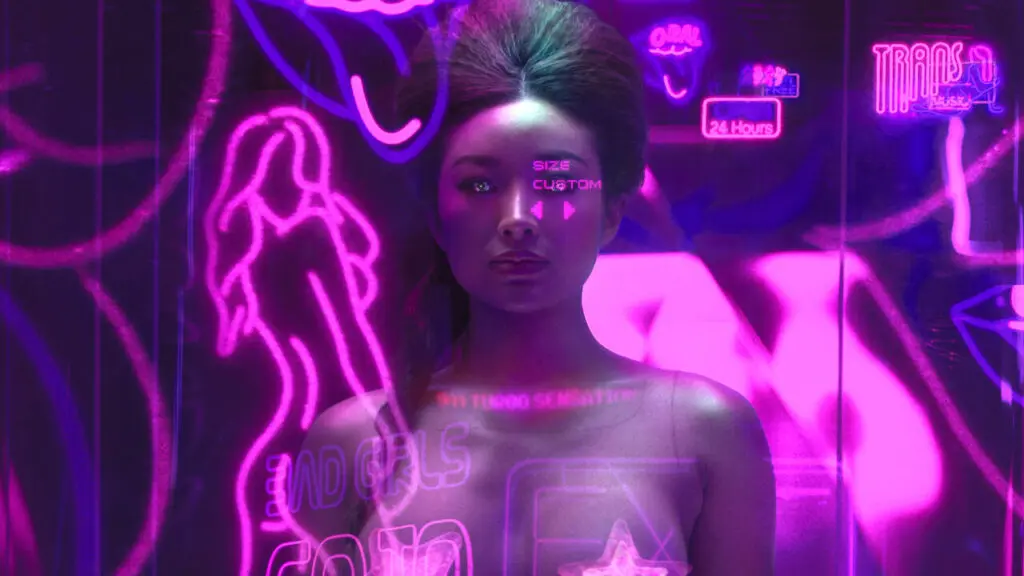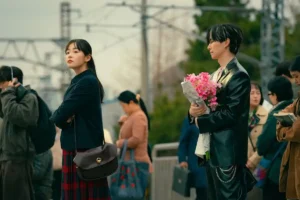Thailand’s Black Mirror equivalent Tomorrow and I blesses Netflix with four – albeit almost feature-length – episodes of speculative science-fiction. They’re all separate stories in an anthological format, so I’ve rounded up the recaps and reviews of Episodes 1-4 in this handy and condensed compendium so you can get a sense of the first season overall.
Aren’t we good to you?
Episode 1 — “Black Sheep”
The first episode, “Black Sheep”, revolves around Dr. Noon, the first female Thai astronaut, who is tragically killed during atmospheric re-entry, leaving behind her husband, Nont. Nont struggles to get over her death, and while her body is being preserved ahead of a Buddhist funeral, he asks Dr. Vee, an animal cloning expert who cloned their dog, Harvey, to clone Noon.
While in space, Noon was working on 3D printing human hearts, and it’s the value of this research that Nont uses to strongarm Dr. Vee into performing the illegal procedure. Unfortunately, it requires Noon’s brain, which leads Nont into conflict with Noon’s very religious family before he’s eventually forced to behead Noon and steal her brain by force.
Examination of Noon’s brain reveals a secret memory – she wanted to transition when she was 19. Her parents never accepted this and she was forced to continue living as a female against her wishes. She never dates anyone except Nont, whom she considered her savior, someone who truly loves her and allows her to be herself. Nont gives the go-ahead for the cloning, but he’s arrested for desecrating Noon’s body and is sentenced to three years in jail.
Once he’s free, he is confronted by a man who introduces himself as Nont. This is the cloned Noon, who is living as a man now and has been offered a permanent position on a lunar colonization program. Five years later, Noon is still printing organs in space, inspired by pictures of Nont, Harvey, and Nont’s original design for a home in space.
Episode 2 — “Paradistopia”

Tomorrow and I Still | Image via Netflix
Tomorrow and I transitions into a more retro vibe in Episode 2, “Paradistopia”, which takes an askew look at the Thai sex work industry, introducing Gamalore City, and a very smart protagonist named Jess who develops realistic sex robots through her company Paradise X.
Paradise X’s robots are developed in conjunction with well-paid sex workers since Jess is conscious of the industry because her mother and several of her close friends were involved in it. But the wider Thai culture is not so amenable; investment is not easy to come by, even from satisfied customers who would rather keep their peccadilloes secret, and the Minister of Arts and Modern Lifestyles Control, Gemina, is particularly antagonistic toward Jess and her company.
As Episode 1 did with religious belief versus scientific progress, Tomorrow and I raises intriguing core debates in Episode 2 with the idea of technology helping society’s understanding of taboo subjects versus undermining the role and value of biological women.
Some of the counter-arguments against Jess’s products come to the fore through Jess’s boyfriend, Witt, who gets carried away testing a new model and becomes violent with it. Case in point: In a real-life encounter this would have serious consequences, but the technician present (also male, it’s worth pointing out) simply reprograms it to enjoy the violence.
Jess experiences violence too, both in a protest and through a businessman from whom she’s trying to secure a license. Witt leaves her and turns against her publicly, suggesting the robots contain hidden cameras, which terrify the businessmen who have already privately purchased and used them. But a while later, this is revealed to be a ruse; Witt was frightening the businessmen into supporting the product.
Jess’s business is a success for a while, but the users predictably ruin it by going nuts with modifications and trying to forcibly reduce the age of the robots. As we see when Witt slaps her the same way he did the test model, the worst fears about how the robots would impact society are coming true. Public pressure eventually leads to the robots being banned, and Jess is imprisoned. When she’s released, she launches a new company selling maid robots who can do anything the customer wants.
Episode 3 – “Buddha Data”

Tomorrow and I Still | Image via Netflix
With a timely focus on AI, Episode 3 of Tomorrow and I, “Buddha Data”, is probably the best of the bunch. It focuses on a coder-turned-monk, Anek, and his opposition to an AI called ULTRA that is behind a merit-based system awarding points for good deeds. Points can be redeemed against things like purchases and utilities but, of course, people are abusing the system and ULTRA can’t properly detect the abuses.
Anek is opposed to ULTRA, as is his friend Atom, but he also sees some upside in it, particularly how it can illuminate Buddha’s teachings. However, it also creates a dangerous loop of instant gratification and doesn’t have any oversight; it’s unable to unpack complex dilemmas and can’t distinguish right from wrong. Ironically, Anek receives merit points after filing a complaint that helps to train the AI.
Of course, Neo, who is behind ULTRA, has a seemingly altruistic reason for the AI’s applications. His parents committed suicide after being swindled by monks who kept asking for donations until no money was left to give. Neo wants to “save” fanatics like his parents from these predatory practices and subvert religion’s most pernicious claims – such as all rewards for devotion coming in the afterlife – by providing recompense in the here and now.
Anek doesn’t trust Neo and sees the key flaw in ULTRA, which is that it cannot provide comfort. So, he and Atom create a rivalrous AI assistant that can, modelled on the brainwaves of a kindly abbot. The product, iBuddha, is an immediate hit, and surges in popularity while ULTRA becomes mired in scandal.
However, in a turn reminiscent of Episode 2, iBuddha also has its share of problems – namely, the abbot once sexually harassed a young girl 40 years prior, and that behavior has been modeled into the AI via his brainwaves. The monk believes that human fallibility is what makes them human in the end, distinct from machines and that he has earned any punishment that might be coming his way. But the scandal leads to iBuddha being shut down.
Dejected, Anek parts ways with his AI assistant and stops being a monk, returning to the city, where Neo’s latest product is still controlling society through a manipulable merit system.
Episode 4 – “Octopus Girl”

Tomorrow and I Still | Image via Netflix
The finale of Tomorrow and I adopts a more overtly satirical and comedic tone, with Episode 4, “Octopus Girl”, feeling less intriguing in its core arguments than the preceding chapters. It’s also more explicitly meta, with frequent fourth wall breaks looping the audience into the joke.
Plot-wise, this vision of the near future has been ravaged by constant rain for two years, leading to multiple natural disasters and extensive flooding. The rich, who don’t have to live in the submerged areas, believe the rain is a blessing. The poor, needless to say, do not.
Within this waterlogged world, a new strain of the dengue virus targets children younger than 10, like elementary schoolgirls Pang and Mook. The latter is completely alone and spends most of her time with the former’s family – her brother, grandmother, mother, and father. But they’re poor, and Pang’s mother’s job has just been outsourced to a robot.
In the midst of this soggy mess, the government announces the AquaVac, a catch-all vaccine for every disease that uses squid DNA and an organism resistant to UV radiation but unfortunately causes anyone who takes it to sprout tentacles on their chin. However, this isn’t much consolation to the poor folk, who don’t believe they’d be given the vaccine at all, even if they were happy to put up with the side effects.
Emboldened by this sentiment, Pang enters a singing competition with a sizeable prize pot and goes viral for claiming that, if successful, she would use her winnings to buy her family a home safe from the water and buy everyone in the district the vaccine. Pang raises a lot of awareness around the district, but it’s still in a bad way, and the Prime Minister, Tang, only pays attention to it to win public brownie points.
When Tang shows up in person, he sees Mook’s red and patchy skin and tries to forcibly push her away, which results in a fracas that removes his mask, exposing his chin tentacles. The government couldn’t afford to disseminate the vaccine and took it all for themselves, leading to public outcry and the dissolution of parliament. The district is rebuilt, everyone gets the vaccine, and Pang and Mook are appropriately honored for their contributions to the district.
A happy ending? Not quite. Episode 4 of Tomorrow and I ends with the rain finally stopping but the sun burning entirely too hot, setting the entire earth alight.




